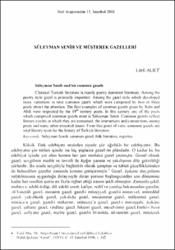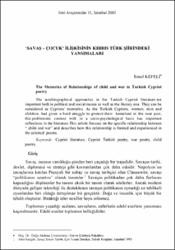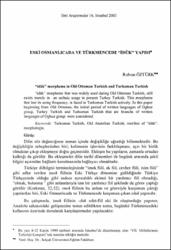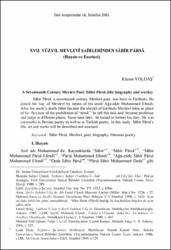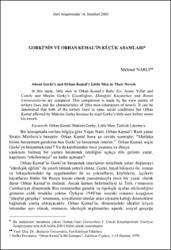Ara
Toplam kayıt 31, listelenen: 1-10
Süleyman Senih ve Müşterek Gazelleri
(Kitabevi, 2003-04)
Classical Turkish literature is mainly poetry dominant literature. Among the poetry style gazel is primarily important. Among the gazel style which developed many variations in time common gazels which were composed by two ...
'Savaş-Çocuk' İlişkisinin Kıbrıs Türk Şiirindeki Yansımaları
(Kitabevi, 2003-04)
The autobiographical approaches in the Turkish Cypriot literature are important both in political and social means as well as the literary one. They can be considered as Cypriots' memories. As the Turkish Cypriots, women, ...
Tevfik Fikret'in Bilinmeyen Bir Şiiri
(Kitabevi, 2003-04)
In this study, an unknown poem of Tevfik Fikret, a revolutionary pen of Turkish literature, is presented. This poem was discovered in lrşad, a monthly review that was published between 1920-1922. As a review, Irşad has ...
İstanbul Üniversitesi, Edebiyat Fakültesi Tarih Dergisi
(Kitabevi, 2003-04)
[No Abstract Available]
Eski Osmanlıcada ve Türkmencede "İdük" Yapısı
(Kitabevi, 2003-09)
"Idük" morpheme that was widely used during Old Ottoman Turkish, still exists merely in an archaic usage in present Turkey Turkish. This morpheme that lost its using frequency, is faced in Turkoman Turkish actively. In ...
Kerime Üstünova, Kutbe 'd-din Izniki, Mukaddime
(Kitabevi, 2003-09)
[No Abstract Available]
Ingeborg Hauenschild, Die Tierbezeichnungen bei Mahmud ai-Kaschgari, Eine Untersuchung aus Sprach- und Kulturhistorischer Sicht
(Kitabevi, 2003-09)
[No Abstract Available]
Dursun Ali Tökel, Divan Şiirinde Harf Simgeciliği
(Kitabevi, 2003-09)
[No Abstract Available]
XVII. Yüzyıl Mevlevi Şairlerinden Sabir Parsa : (Hayatı ve Eserleri)
(Kitabevi, 2003-09)
Sâbir Pârsâ, a seventeenth century Mevlevi poet, was born in Gelibolu. He joined the way of Mevlevi by means of his uncle Ağa-zade Muhammed Efendi. After his uncle's death Sâbir became the sheykh of Gelibolu Mevlevi-hane ...
Gorki'nin ve Orhan Kemal'in Küçük Adamları
(Kitabevi, 2003-09)
In this study, little men in Orhan Kemal's Baba Evi, Avare Yıllar and Cemile and Maxim Gorky's Çocukluğum, Ekmeğimi Kazanırken and Benim Üniversitelerim are compared. This comparison is made by the view points of writers ...

